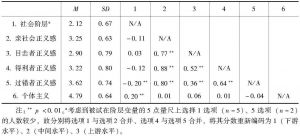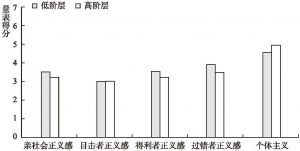论文
亲社会正义感的阶层差异:个体主义的调节作用
摘要
亲社会正义感是对他人不公遭遇的情感、态度与反应能力或行为倾向,是亲社会行为的重要体现。考虑到不同阶层的文化和心理差异,本研究探讨亲社会正义感的阶层差异,以及个体主义对这一阶层差异的调节作用。结果发现,相对于高阶层,低阶层表现出更高水平的亲社会正义感(主要是得利者正义感、过错者正义感);同时,个体主义对亲社会正义感的阶层差异起调节作用,当个体主义较低(VS 较高)时,亲社会正义感有更大的阶层差异。研究揭示了亲社会正义感的阶层差异及其文化价值基础。当资源匮乏的低阶层不执着于个人目标时,则会在道德上表现出更多的亲社会倾向。
作者
吴胜涛 ,厦门大学社会与人类学院副教授,硕士生导师,通信作者,E-mail:commuagent@163.com或michaelstwu@xmu.edu.cn
王平丽 ,厦门大学新闻传播学院本科生
陈咏媛 ,中国社会科学院社会发展战略研究院助理研究员。
Wu Shengtao
Wang Pingli
Chen Yongyuan
检索正文关键字
论文目录
-
一 前言
- (一) 正义感与亲社会正义感
- (二) 阶层、文化与亲社会行为
- (三) 研究问题与假设
-
二 方法
- (一) 被试
- (二) 工具
- 三 结果
- 四 讨论
查看更多>>>




